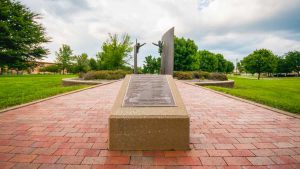
Bipartisan, bicameral legislation led by Indiana Republicans U.S. Sen. Todd Young and U.S. Rep. Susan Brooks establishing an African American Civil Rights Network site in their home state to honor two of the nation’s brightest pro-freedom stars has been signed into law by the president.
The Kennedy-King National Commemorative Site Act, H.R. 4851, designates a site at the Landmark for Peace Memorial in Martin Luther King, Jr. Park in Indianapolis as the Kennedy-King National Commemorative Site, according to the text of the bill.
Quite fittingly, President Donald Trump signed the bill into law on April 4, which marked the 50th anniversary of Dr. King’s assassination. It was also the day that former U.S. Sen. Robert F. Kennedy (D-NY), a newly announced presidential candidate, decided to announce King’s mortal wounding to a crowd in a predominantly black neighborhood in Indianapolis. The iconic speech became a eulogy, calmed angry, grieving Americans in the city, and prevented rioting, which was taking place elsewhere around the nation in protest of King’s killing.
U.S. Rep. Andre Carson (D-IN) introduced H.R. 4851 on Jan. 19 with Rep. Brooks cosponsoring the bill, along with 26 other members, including U.S. Reps. Larry Bucshon (R-IN), Jackie Walorski (R-IN), Barbara Comstock (R-VA), and Joseph P. Kennedy, III (D-MA). U.S. Sen. Joe Donnelly (D-IN) joined as a cosponsor when Sen. Young introduced the companion bill, S. 2332, in the U.S. Senate on Jan. 23.
“To this day, Hoosiers warmly remember Sen. Kennedy’s moving speech and recognize his heartfelt words as the reason Indianapolis remained calm and peaceful while riots swept much of the nation in the aftermath of Martin Luther King, Jr.’s assassination,” said Sen. Young, after the bill was signed into law. “This legislation recognizes a significant moment in Indiana’s history.”
Rep. Brooks noted that RFK’s “powerful message of unity and peace in response to violence is more timely and important than ever.” She said, “As a nation, I hope we can look back to Dr. Martin Luther King, Jr.’s legacy and Sen. Kennedy’s remarks and learn from their calls for unity.”
Added Rep. Carson, “With today’s bill signing, we are bringing much needed recognition to a site that epitomizes the ideals of Senator Kennedy and Dr. Martin Luther King. As new generations carry on the march toward civil rights, I hope that this site will serve as a reminder of the need for non-violence and tolerance in our community and world.”
In a joint op-ed published on March 29 in the Indy Star to support their bill, Reps. Brooks and Carson recalled how in 1968 RFK had been in Indianapolis for a scheduled campaign event when news broke of Dr. King’s death.
“Sen. Kennedy learned of the devastating assassination of Dr. King before it was widely known to the public. Instead of accepting the advice of those around him, Sen. Kennedy made his way to the local park in Indianapolis at 17th and Broadway,” the lawmakers wrote. Despite a police warning that adequate protection couldn’t be ensured if the crowd turned unruly, RFK was undeterred and “broke the news to over 2,500 Hoosiers of Dr. King’s shocking death instead of giving his previously prepared campaign remarks,” they wrote.
RFK spoke “powerfully, emotionally and with understanding,” according to the lawmakers’ column, empathizing with the crowd’s pain as he shared his own following the assassination in 1963 of his brother, President John F. Kennedy. “He instilled the importance of unity and peace during a time of turmoil, confusion and despair. Sen. Kennedy concluded his remarks by encouraging everyone to return to their homes and say a prayer for Dr. King’s family, our country and our people,” they wrote.
And as “hostility and violence” erupted in communities across the United States, Reps. Brooks and Carson noted in their column that “Indianapolis remained calm. Indianapolis did not burn.”



